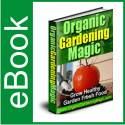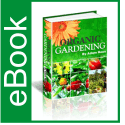Five Tips For How to Grow a Vegetable Garden
Five Tips For How to Grow a Vegetable Garden
Article by Zack Wilson
News reports of vegetable batches tainted with pesticides, constant general anxiety over the safety of non-organic vegetables (and fruits), and fluctuating prices for crops: with all that negative stigma surrounding the crop market, who wouldn’t want to know how to grow a vegetable garden? Start learning not only how you can grow a crop garden, but learn how you can reap the great benefits of one.
1) Benefits of a home-grown vegetable garden
Growing a vegetable garden is fun and very rewarding. Once you know how to grow a vegetable garden, it offers you the chance to grow and consume vegetables that your local grocer may not even sell. Furthermore, think of the potentially huge savings on groceries. Topping it all off-you get vegetables that actually taste 100% fresh and don’t have to worry about potentially harmful pesticides that are all but too common with the retail variety.
2) Getting started
Establish the garden plot, or spot of soil that’ll be marked off for the garden, that’ll both accommodate your physical/aesthetical needs as well as the needs of the actual plants. What’s wonderful about a homegrown garden is that the space needed can be very small or very large-all depending on your space and particular desires.
3) Prepare the plot to withstand the elements
Learn how to grow a vegetable garden that’s sustainable even from the weather. Make sure the plot is located in an area that will benefit from the most sunlight. Additionally, ensure that the plot of land is sufficiently “high” enough or slanted so that water can properly drain. The elements, or Mother Nature, can be harmful. Too much wind, not enough rain and even too much rain can complicate things. Make preparations before you even start planting seeds.
For example, if you live in a region where there is pretty moderate or greater wind year-round (and your plot doesn’t have adequate protection from wind), make sure that you install devices to mitigate the wind’s effects on your crops. These devices can be a number of things, such as large shrubs placed around the perimeter (but not too close, of course, due to the roots’ needs). If your community often suffers from dry periods, consider a sprinkler system. Or in the case of too much rain, make certain that there is a little additional capacity for water to runoff.
4) Good soil quality is fundamental
Perhaps the single most important element of knowing how to grow a vegetable garden is the condition of the soil. An easy way to make sure the soil is rich in minerals and nutrients is to obtain a pH tester. The pH level in soil basically decides whether your garden will flourish or not. Practically any Wal-Mart, hardware, or garden shop carries them, and the sales staff will be glad to show you how to use it. Alternatively, you may also (most of the time) take a sample of the soil to a garden center or anywhere that sells plants to have it checked. Either way, though, the best pH level for soil is around 6.4-6.6.
Once you have a good plot set up, aerate the soil. Depending on the size, this could be done by hand with a handheld shovel, or an automatic aerator for larger plots. Loosen the soil all around the plot up to about half-a-foot down. Unearth all weeds you come across and toss them, but never use pesticides or weed killers around plants meant to be consumed.
5) Sustaining a garden all year long!
The local gardening/outdoor shop will serve as the best source for information when it comes to what kind of seeds to buy. However, it can be stated that “organic” fertilizer is usually far superior to many commercial, inorganic brands. As far as the types of crops, most people generally vegetable plants that sustainable all year. And finally, plan to rotate the plants at least a few times a year.
About the Author
Zack Wilson is an avid organic gardener, for more comprehensive information on how to grow a vegetable garden visit my website where you will also find many articles on organic gardening, problems with gardening, easy steps to organic gardening, making money with your garden and much much more.http://www.organicgardenallyear.com

 October 31, 2011
October 31, 2011 







